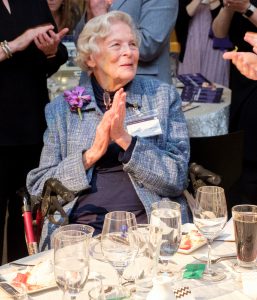Understanding the Engaging with Aging (EWA) Experience Among Independently Residing Older Adults: A Validation Study – Shaoqing Ge
 Developed by a nonagenarian, the concept of Engaging with Aging (EWA) describes an active, conscious daily living process of coping with age-related changes (ARCs) taken on by an older adult or on behalf of the older adult. Although EWA provides a novel perspective to understand older adults’ experiences of managing daily living challenges caused by ARCs, the concept has yet to be validated. The purpose of this multi-method study is to validate and refine the conceptualization of EWA by describing the aging experience among independently-residing older adults. It is anticipated that findings from this study will deepen our understanding of older adults’ aging experience and conceptualization of EWA.
Developed by a nonagenarian, the concept of Engaging with Aging (EWA) describes an active, conscious daily living process of coping with age-related changes (ARCs) taken on by an older adult or on behalf of the older adult. Although EWA provides a novel perspective to understand older adults’ experiences of managing daily living challenges caused by ARCs, the concept has yet to be validated. The purpose of this multi-method study is to validate and refine the conceptualization of EWA by describing the aging experience among independently-residing older adults. It is anticipated that findings from this study will deepen our understanding of older adults’ aging experience and conceptualization of EWA.
Identifying the Optimal Timing of a Daily Cognitive Training Intervention for Older Intensive Care Unit Survivors - Maya Elias
 More than 60% of intensive care unit (ICU) patients are adults ages 60 and older, who are at high risk for ICU-acquired cognitive impairment. ICU survivors often experience sleep disturbances and inactivity, and almost 80% of ICU patients experience disturbances in circadian rhythm, which may affect cognitive function. Understanding the optimal timing of cognitive interventions is crucial to promote circadian realignment and cognitive function, and may improve intervention feasibility, acceptability, and efficacy. The goal of this project is to determine if time of day impacts how effective a computerized cognitive training intervention is at improving cognition in ICU survivors.
More than 60% of intensive care unit (ICU) patients are adults ages 60 and older, who are at high risk for ICU-acquired cognitive impairment. ICU survivors often experience sleep disturbances and inactivity, and almost 80% of ICU patients experience disturbances in circadian rhythm, which may affect cognitive function. Understanding the optimal timing of cognitive interventions is crucial to promote circadian realignment and cognitive function, and may improve intervention feasibility, acceptability, and efficacy. The goal of this project is to determine if time of day impacts how effective a computerized cognitive training intervention is at improving cognition in ICU survivors.